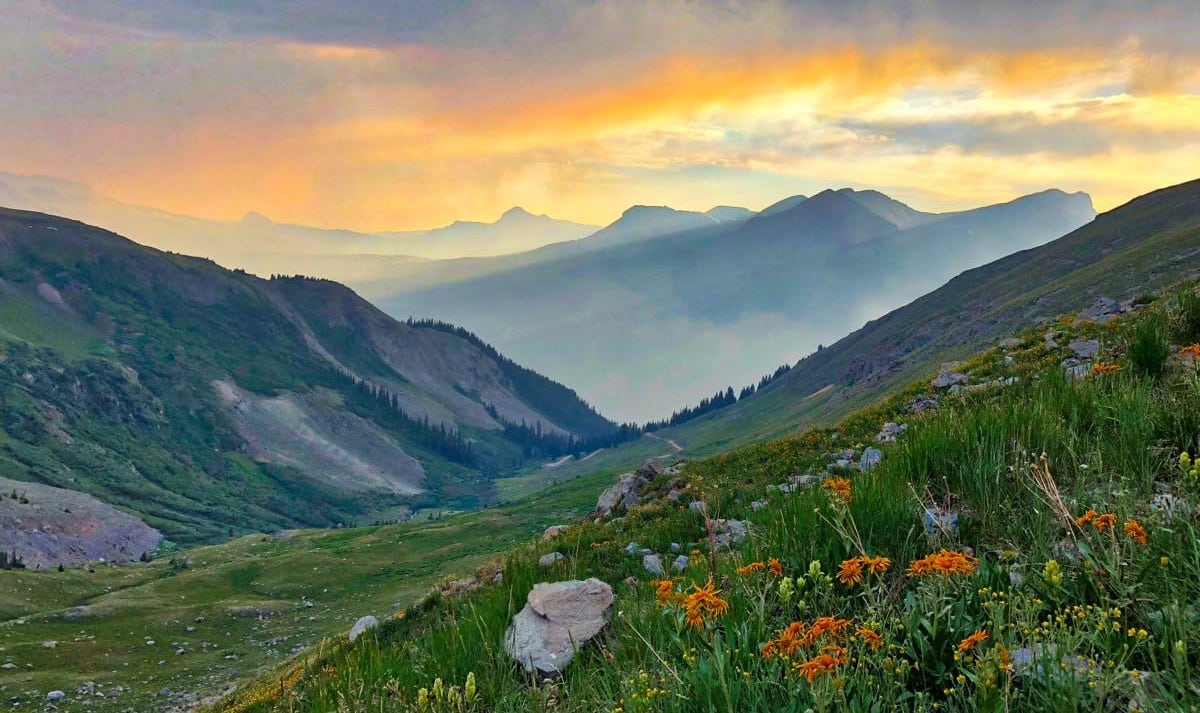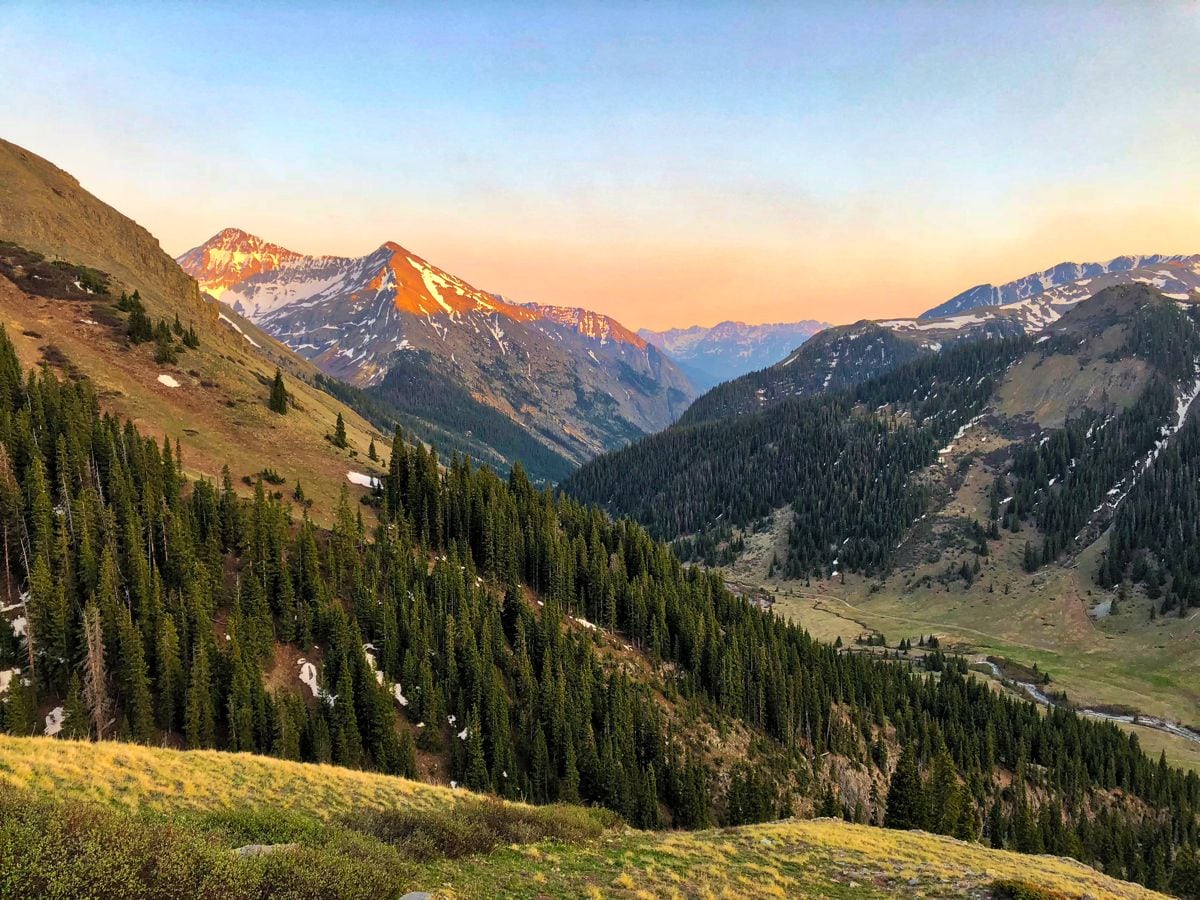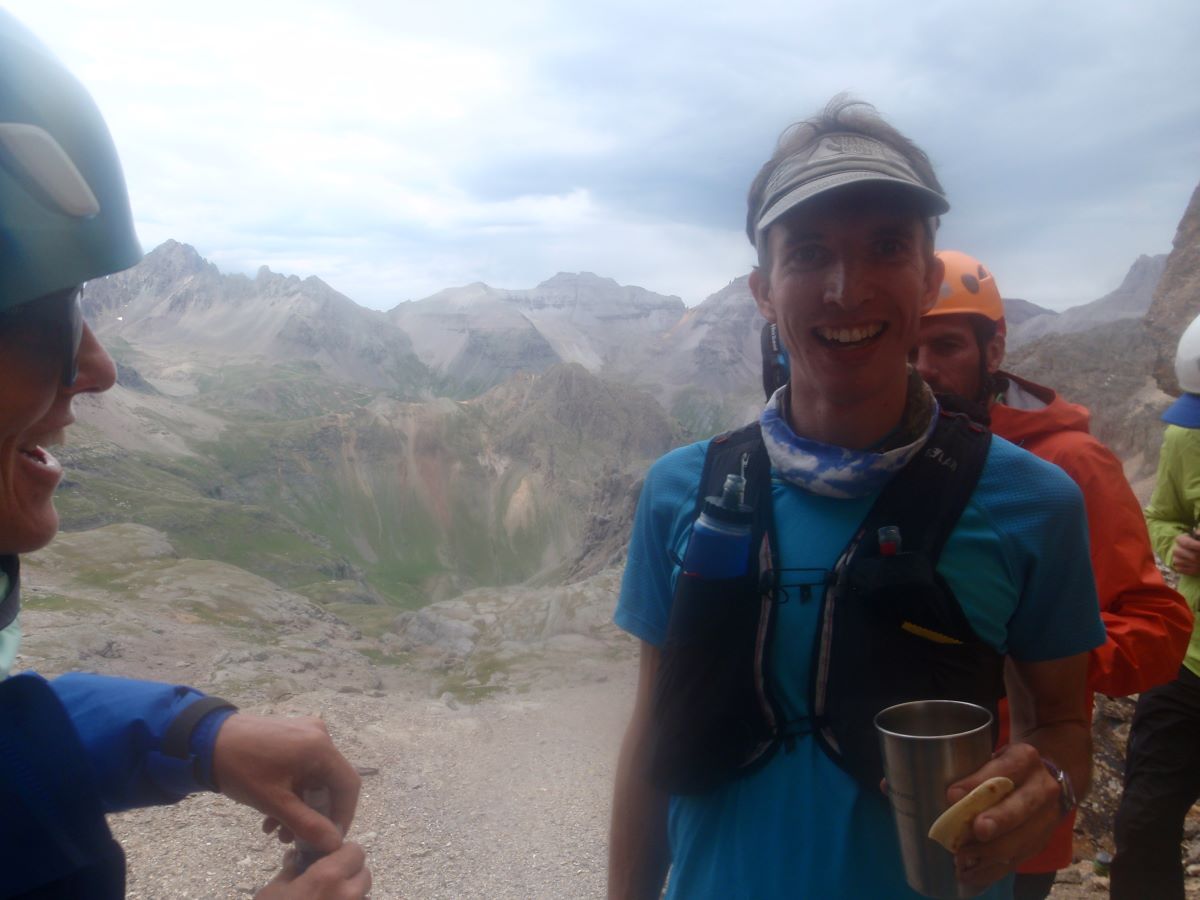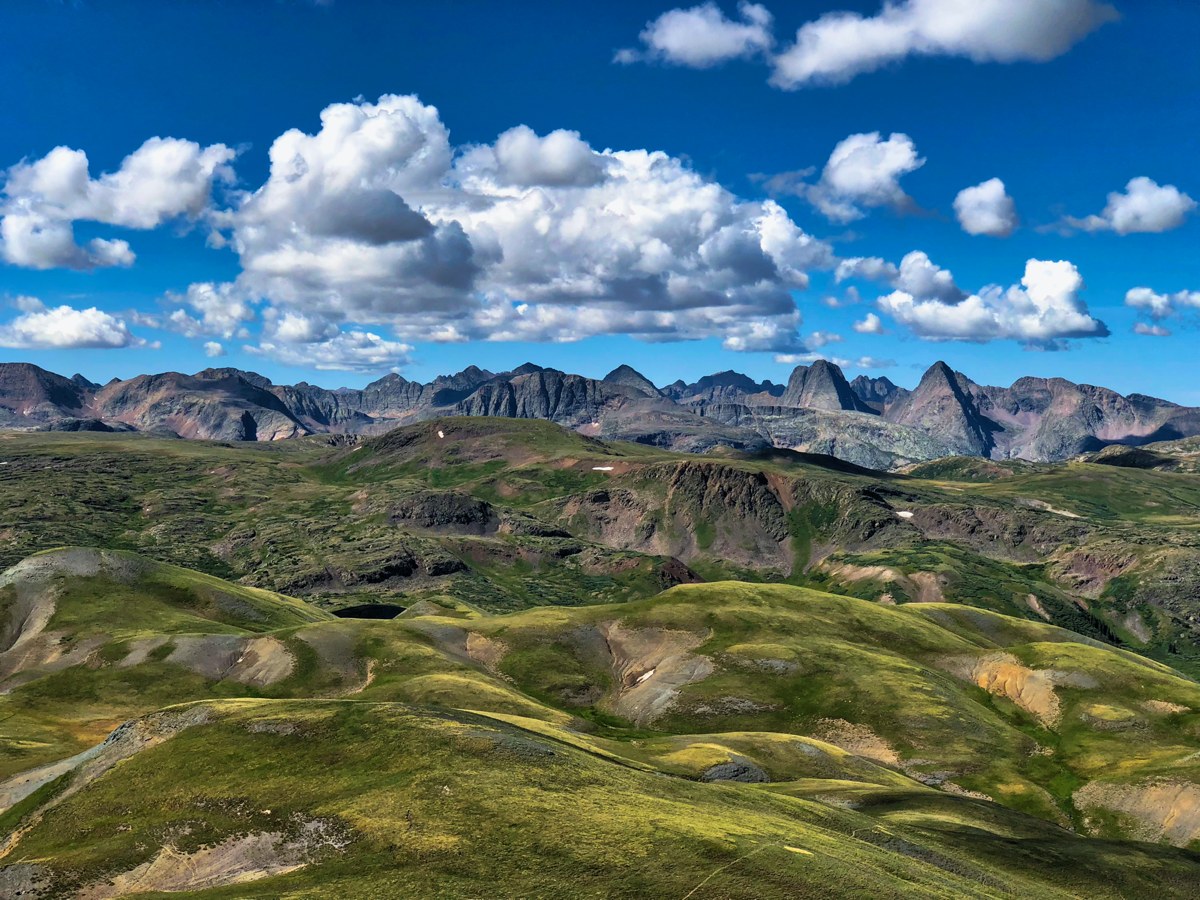[Editor’s Note: This month’s Community Voices submission is by guest writer Jeff Rome about his second-place finish at the 2018 Hardrock 100. In this narrative, Jeff offers us a moving look at how the Hardrock 100’s terrain, community, and competition meld together for him.]
Cunningham Gulch is more a canyon than a gulch, but depressions in vertical relief are so innumerable here that, out of the laziness of being overwhelmed, cartographers named every valley, ravine, gorge, gully, and canyon either a gulch or a basin. Climbing out north or south of the canyon involves roughly a half-mile vertical hike, from creek to mountain pass, enough gain that parked cars at the trailhead appear roughly the same size as the petals of wildflowers afoot.
The gulch — canyon? — lies several miles north of Silverton, Colorado, and has seen its days of tragedy. Six miners died here in an avalanche on Saint Patrick’s Day in 1906, and 12 died in Arrastra Gulch, just a mile distant, the same day. The snow was said to have filled the canyon 150 feet deep in what must have been preceded by a thunderous, soul-churning sound.
But mostly, it’s quiet here. The trickle of the creek is interrupted largely by birds, and if you’re in the right spot you can hear one of several different waterfalls. I camp here when my business for the night is sleep, or to look at the stars. If you watch the stars long enough in this deep canyon, you can tell the world is turning. The narrow view of the sky here comforts me.
Cunningham Gulch is where my world changed. And where, every year, Hardrock 100 participants journey through on their way to kiss the Hardrock. It is a small sliver of a much larger course that connects mountain towns with mountains and creeks and passes and mining ruins for a 100-mile loop tour of the San Juan Mountains.
I arrive here on Saturday, July 21, 2018, at sunrise, 91 miles into my journey, to cheers and hollers and thoughts of the finish. Already I’ve had the best race of my life and am surprised at what my body and mind have been managing to do. I believe I am in third place, and imagine that the leader, Xavier Thévenard, has already finished and second place, Jeff Browning, is on the final descent, an hour ahead. Instead, at a moment when I am ready to relax for one last time at the aid station ahead, something unexpected is uttered to me by a volunteer. This is where I learn I could win Hardrock.
I cannot tell this next part of the story without telling the whole story, or at least a greater portion of it. Hardrock is a run that has encompassed my life now for most of my adult years, either running it, training for it, or thinking about it since I first went to the San Juans in 2010 and heard mention of it.
So let us start from earlier…
The Fire
A fire started in late May of 2018, within two days of my moving to Durango, Colorado, for the summer, sparked by a coal train carrying tourists into the mountains. Every morning in Durango, and every evening in Silverton, the landscape would fade away into sepia-toned silhouettes as smoke from the fire blew with the shifting winds and settled, haunting the mountains. The San Juan National Forest closed. The Durango city trails closed. I felt caged in a town with a landscape lost to the smoke, out of sight and out of reach.

A smoky view from Kendall Mountain when wildfires threatened cancelation of the 2018 Hardrock 100. Photo: iRunFar/Bryon Powell
With the closures, the nearest accessible trails were one hour north from Durango, near the Hardrock course, so my weekdays began to include after-work drives to the smoky San Juans, running into the night, with a smoke mask. As the smoke thickened, I developed a cough that would last up until Hardrock.
Until late June, when the race director gave the green light, Hardrock’s happening was up in the air. Many doubted whether it would happen, but no one let up on their training. With or without a run to train for, any Hardrocker will spend their days in the mountains because that is just what we do. I was fortunate enough to have the company of Bryon Powell on a couple runs in the midst of the fire’s growth and we discussed how getting to run Hardrock would be a bonus to an already great summer getting to train in the mountains. There is so much to enjoy just in the journey to the starting line. (See Bryon’s article on this topic.)

Sunset from Cinnamon Pass Road above Animas Forks near the Hardrock 100 route. Photo: iRunFar/Bryon Powell
July, Camp Hardrock
There is a swell in my heart, so it must be July. This is the month when I tip best, send off the most postcards, and when magic happens. This is Hardrock month. The mountain running world, runners and non-runners alike, converges on tiny Silverton, Colorado, where the local cemetery holds far more residents than the town itself. Still, even with the influx, it is quiet. We spend a great deal of time hiding out from each other, reserving our energy, still burrowed in the hibernation of tapering. We all know that on Friday we’ll use our whole heart and soul to celebrate the mountains.
5:30 a.m., Friday Morning Check-In
The Silverton School gym, once each July, has the world’s greatest concentration of beautiful calves attached to giddy minds. We lucky runners have sacrificed a social life, and maybe a marriage or two, to be here. This is our lifestyle, and Friday, July 20, 2018, this is the day that what we do becomes not just acceptable, but lauded over. It is a mountain running holiday.
I walk the streets for a short reprieve. The stars are visible, and I see no one else ambling about. This morning, there is little to suggest that, just blocks away, 146 souls are about to embark on Hardrock. The clock counts down silently to the start time while I roam vacant streets, as dawn tempers with night. When I return, I soon find friends. They are excited for me, and I for them, and one would hardly think any of us had a glimmer of competition in us, but part of each of us is dead serious; we are here to kick butt.
Five minutes before the start, we gather loosely behind an imaginary line. I hug my pacer, Alissa St. Laurent, before rifling in, and settle in by Jeff List and Kevin Davis, both good company with whom I hope to share some miles.

Jeff Rome with the number 1 bib at 2018 Hardrock 100 as the top returning finisher from 2017. Photo: Alissa St Laurent
The First Miles
When the run begins, I feel healthy, calm, and as though this huge endeavor was merely a matter of routine; go out, be smart, and have fun. I feel a confidence in myself with staying back in the field, and settle into roughly 30th position, telling jokes and chatting with Nikki Kimball, Kevin Davis, and Darla Askew.
“How do you find Will Smith in the snow?”
“Look for fresh prints!”
I let the miles come and go as they will, not trying to force myself to push or hold back, and gradually move up in the field. Running down Grant-Swamp Pass I nearly take a fall, but I am excited to feel good enough to run down scree and trust that any fall would be just scrapes and bruises. On the climb up Oscar’s Pass, I keep calling for rain and get just a spout of a drizzle at the top, long after I felt hot. But the day is gracious enough to water me off and on, even though it’s sparingly.
The rough parts for me are the valleys. Heat and sun have always made me fatigue easily, but at Hardrock, this is offset by having aid stations in the valleys. Being a strong uphill hiker also ensures that I never lose morale by being passed on the climbs out of the valleys. I just hike and survive to cooler climes at altitude where I feel more comfortable picking up the pace.
I hit the town of Ouray in the heat of the day and briefly think a detour for a milkshake at Mouse’s might be a good idea. Perhaps next time I’ll have to plan for one at the aid station. I am excited to pick up my pacer, Alissa, and we leave town in a jiffy.

Jeff Rome refueling at the Virginius Pass aid station, mile 33, in the 2018 Hardrock 100. Photo: Anna Frost
Having a pacer who knows how to run a solid 100 miler, like Alissa — the course record holder at Cascade Crest 100 Mile, fifth at the Western States 100, sixth at UTMB, and more — puts some extra pressure on me to do well. I don’t feel like I should have such a solid pacer if I don’t have a solid race myself. I know it would be dangerous to push the pace too early, but she helps me to set myself up well for the end miles and to keep things rolling.
Nightfall
This is when the excitement begins. At Grouse Gulch aid station, I spend a good deal of time trying to get calories and fluids in — I’d vomited at Engineer aid station seven miles back. While I’m sitting down, still slurping noodles, Alissa tells me, “This isn’t a camping trip! You need to go!” I think that was the beginning of a gradual realization that it was about time to race.
Leaving Grouse, Alissa and I are ascending the highest part of the course, at night, with strange accordion music floating down the mountain, courtesy of Rickey Gates and company. Neither of us even verbally acknowledges the merry band, maybe because so many otherwise absurd things seem normal in the middle of 100 miles.
I know I’ll gain some ground on the long ascent up Handies Peak, the course’s high point, and by the top I cool down and reset enough that I feel fresh for having traveled 60 miles, and decide to start taking downhills a little faster, passing Jesse Haynes on the way down. The moon at my back on the descent keeps making me think Jesse is on my shoulder, with the world’s brightest headlamp, and perhaps this too helps me to start speeding up.
Alissa tells me she hopes I’ll drop my next pacer, and I keep that in mind when I pick up Mathieu Brown at Sherman aid station (mile 72) in fifth place. I learn there that I just gained some ground between aid stations on the next runner ahead of me, Ben Bucklin. I feel ready to hunt.
Meeting Mathieu, Spring of 2010
Attending Prescott College in Arizona, I took a semester-long class called Adventure Education, taught by the man, Mathieu Brown, whose endurance achievements were legend among the student population. While others would talk of epic days in the mountains with hyperbole, with seriousness, with a grin on their face, Mathieu would always be laughing and saying golly or gosh. He was as adept at running as at rock climbing, or river rafting, or mountain biking, or skiing, and I knew he had run 100 miles in under a day at Leadville 100 Mile. This, to me, seemed the ultimate achievement, and my man-crush on Mathieu was what got this whole train rolling. I knew then that trail running was what I wanted to do. So, I began Hardrock wearing a visor gifted to me by Mathieu.
When I finally start running with him at mile 72, I experience some of the best running of my life.
Sherman On
I start powering the uphill, feeling out how much energy I have left, and relaxing on the effort when things get flat. Mathieu brings along a joyful energy and encourages every tiny surge I have on the uphill. Toward Cataract Lake, we stop seeing any course marking, and I have a brief thought that somehow we may be off trail. I had done trail work on this section, though, and reassured myself that I was on the right path by looking at all the lopped willows. I wouldn’t find out until later that eventual winner, Jeff Browning, had turned back here to return to flagging, thinking he was off track, and lost 45 minutes.
Toward the pass, we begin to see two headlamps, Ben and his pacer. At first, they’re dots, then I start to make out the differences in light as he looks about, and soon after I make out the outlines of Ben, his pacer casting a light on him from behind. At the crest of the pass, I manage to pass Ben and rally some strength from my reserve to put distance on them once passed. This is no longer a run. It’s a race.
There is something magical about this night. I find myself putting down food easily, thinking clearly, and having a drive I didn’t know I had. Part of it is the thrill of being paced by a new dear friend in Alissa, and now running with the man who got me hooked on this lifestyle. And partly this was the plan. I held off early because I wanted to be running at Pole Creek. Plans so rarely come to fruition in 100 miles, but right now the plan is working.
By Pole Creek aid station, Ben’s light is distantly behind, and Troy Howard’s light is coming into view. Farther on, at the Maggie Gulch aid station, I learn I’m seven minutes back from Troy. Somehow, I’m cutting off chunks of time from runners I was intimidated by going into the race. I know Troy will be the last runner I can possibly catch, and I want to catch him soon if I’m able, and have breathing room in the final miles.
Earlier in the week, while tapering, I read the book “Unbroken,” by Laura Hillenbrand, mailed to me for inspiration by my friend Dylan Brann, in Maine. There is a section in that book about Louis Zamperini running the last lap of the 1936 Olympic 5,000 Meters in 56 seconds, a ridiculous speed for the time. On that lap, he had thought, “Let go!” “All I had,” Louis would say after the race, “I gave it.”
At this point in the race, aiming to pass Troy and gain the podium, I think of Louis. I know Troy climbs slower than I do, having passed him on two different uphills earlier, so I know I can whittle away some distance on the climb up to Buffalo Boy Ridge. I’m also still trying to drop Mathieu Brown, who’s hung on and remained his jubilant self for the past several hours, showing little indication of slowing down. I enjoy his company, but enjoy the challenge from Alissa more — to drop Mathieu Brown, a legend to me, would mean a lot.
I begin giving my all, and find myself breathing hard, feel my legs start to burn, and can hear Mathieu behind me huffing away. There is no more conversation. We make up that seven minutes and then put some ground on Troy before we even hit the ridge, in a distance of 1.4 miles with about 1,400 feet of climbing. I feel incredible and later was astonished to see that I ran this section from Maggie to Cunningham as fast as the course record split, held by Kilian Jornet, in a time of 1:33 even.
Cunningham On
And now, after all that effort, I must put in a greater one…
Let us hope that the most exciting moment of my life has come and gone, because if I were to get any more excited I might well die.
At Cunningham I learn three things: 1) the race leader, Xavier, is out of the race, 2) Jeff Browning, the new race leader, is only six minutes ahead of me, and 3) I will have to continue to dig. I learn this en route to the aid station, and on arriving tell my last pacer, Ellen Silva, “It’s going to be fast!”
Ellen brought me to the finish in 2017 and, this year, drove up five hours from Santa Fe, New Mexico, after work to do this. She was a golden hour finisher (finishing between 47 and 48 hours) at Hardrock in 2016, but is about to keep up with me on one of the fastest splits from Cunningham to the finish there will have been. I am continually impressed by what a difference race energy can make in speed, both for runners and pacers.
At Cunningham, my drop bag isn’t ready, so I start throwing things from my pack on the ground to shed weight, eat some M&Ms, and take off — full of the knowing that if I nail this and Browning doesn’t, I could win this thing.
On the first switchback, I start to run out of breath because I’m actually running, not hiking, up one of the steepest and longest climbs of the course. This is reality. I realize I can’t keep up such a ridiculous pace, and slow to a strong climb. I know Browning is good, and I never think I’ll catch sight of him on the last climb, but soon enough there he is, trekking along just like me, several switchbacks ahead.
I want to hide. I nearly duck when I see him look down at me, then back at the trail, and pick up pace. Damn it! I’m already working hard, and there he goes, charging up the hill now. From here I gain no further ground, but keep pace with him until the pass. Once I hit the pass, I do a double-take even though I stay looking straight ahead.
Where did he go? Was I missing him behind a turn? The drop down from Little Giant Pass is open terrain until the road over 1,000 feet below, and from up so high the road seems so small, so distant. I know then that it’s over. I will not pass the one person left.
My run to the finish from the pass is full of joy. My pacer Ellen catches up to me on the downhill and runs in front, keeping the pace strong all the way to the end. I never really think this is real until I kiss the rock. How am I about to finish second?
Looking back on it, I am incredibly lucky to have had the finish that I did, and thank the universe for granting me this experience. I will not complain if I never have another like it.
Epilogue: Never for Money, Always for Love
In the month following Hardrock, I roamed the American West until I absolutely had to leave for my fall semester at school. And I had some changes to my life. I now own not only a watch that measures distance, but also a smartphone and have been far more active on social media. I’m not sure any of that is good.
I also dealt with some depression that made it difficult to camp out on my own for more than a few days at a time. It was difficult to come down from the greatest high of my life, but I stayed with friends in Washington and Montana in between camping alone and being around other people helped.
What I need to remember is to keep loving what I’m doing. I know I wouldn’t fare well mentally if I let myself get caught up in this second-place finish more than I already am. It’s time to take a long breather. Until the Hardrock lottery. Then may the mountain spirits grant me another chance at the run that has filled me with so much joy these past years.
Whether I run it or not, I will be there. By now I know it’s where I belong. It is my place, my people, my wildflowers. Nothing else can make me tear up so easily, and the memories I make in those mountains make them more beautiful each year. It is the most difficult thing to wait for, and when it happens, with so many friends coming to my favorite place, I never want it to end.
Until next year … I hope to see you there. For some of you, who, like me, have seen the magic of Hardrock, I know we’d rather be no place else.
Call for Comments
Do you have any special memories of the Hardrock 100? Let us know!


